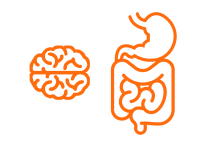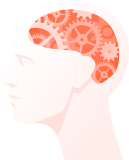The Microbiome
Healthy human adult microbiome (microorganisms that inhabit the body) has been timated to outnumber human cells by a ratio of ten to one, and the total number of genes in microbiome exceeds the number of genes in the human genome by a factor of at least 200 (about 4 millions of genes versus our 26,600) and may accound for up to five pounds of adult body weight. The microorganisms that colonize the surface and insides of our bodies are essential for life and maintaining host health. The microbiome defends host against pathogens, metabolizes dietary nutrition, affects food absorption, participates in the activation of certain drugs, mediates epigenetics, generates molecules that reduce inflammation, play fundamental role in the induction, basic development, training, and function of our immune system, and so on. Pathogenic dysbiosis (microbiome-host maladaptation) may influence the suceptibility to certain infectious diseases as well as to contribute as a key factor to various diseases such as Crohn's disease and Irritable Bowel Syndrome, for example. The newly knowledge of the different functions of the human microbiome has been at the origin of an ongoing reevaluration of the physiopathologenic events occuring in various diseases. This reevaluation includes CNS diseases as more and more clinical and scientific research evidences suggested a complex bidirectional communication network between the gut and the brain, the so-called gut brain axis, altered in numerous SNC diseases.
The Microbiota-Gut-Brain Axis
Recent studies suggested that gut microbiota participated in gut-brain axis functions and played a major role in bidirectional signaling communication between gut and brain, so the gut-brain axis was extended to Microbiota-Gut-Brain Axis (MGBA). MGBA modulates immune, gut and brain functions. For example, bidirectional signaling communication between gut microbiota and CNS could influence, host stress response, mood, pain perception, neurochemical and gut-brain axis. MGBA has revealed an extremely fascinating communication system by means of neural, endocrine, immune and humoral links. Recent preclinical studies and clinical trials have shown that gut microbiota was modified in various neurological and psychiatric diseases and that probiotics could alleviate/counteract symptoms occuring during the time course of these diseases.
Brain disorders
The discovery of the human microbiome role has resulted in the reevaluation of many concepts of health and diseases, including CNS control through MGBA. Unbalanced microbial colonization of the gut has been recently described in patients with Parkinson's disease (PD), Alzheimer's disease (AD), Autism Spectrum Disorders (ASD), Multiple Sclerosis (MS) and migraine. In PD patients, gastrointestinal disturbances associated with microbiotal imbalance often precede motor symptoms, and α-synuclein is present in the enteric nervous system prior to its appearance in the brain. In animal models of AD, brain amyloidosis may be associated with pro-inflammatory gut bacteria and Aβ amyloid pathology disappears in the absence of gut microbiota. In MS, the immunologic disorders are associated with the alteration of the human gut microbiota and host innate immune function. In psychiatric diseases, particularly in ASD and mood disorders, alterations of MGBA are emerging as important pathogenic factors regarding the very recent studies demonstrating unbalanced gut mocrobiota and improvement of symptoms using psychoprobiotics into animal studies and clinical trials.
Psychobiotics and Neurobiotics
The term "psychobiotics" was introduced in 2013 by Dinan et al. and originally referred to a subset of "probiotics" that could produce a health benefit in patients with psychiatric, or cognitive illnesses. World Health Organization (WHO) 2001 definition of probiotics is live microorganisms (mainly bacteria) which, when administered in adequate amounts, confer a health benefit on the host. The introduction of the concept of "probiotics" (pro=for and biotikos=life) is generally attributed to Nobel recipient Elie Metchnikoff. He first (1907) suggested the possibility of colonizing the gut with beneficial flora that replace harmful microbes (bacteria) and add beneficial microbes (bacteria) normally present in the gastrointestinal tract. Probiotics are considered to be generally safe as commensal bacteria. At the present time, a lot of experimental studies and clinical trials have confirmed this hypothesis. Two systematic reviews from 2016 examined the preclinical studies and small human trials that have been conducted with certain commercially available strains of probiotic bacteria and identified those that had the most potential to be useful for psychiatric disorders. Today, the definition of probiotics has been expanded to include prebiotics, which act as food for probiotics and encourage their viability, growth and colonization in the gastrointestinal tract. Similary to psychobiotics for psychiatric disorders, we could expect to have in a near future "neurosynbiotics" in the field of neurodevelopmental disorders and neurodegeneratives diseases. In this context, NeribiOm is seeking novel bioengineered probiotics to propose neurosynbiotics as innovative tools to alleviate symptoms in psychiatric disorders and as first-in-class therapies for the treatment of neurodegenerative diseases such as PD, AD and MS.




